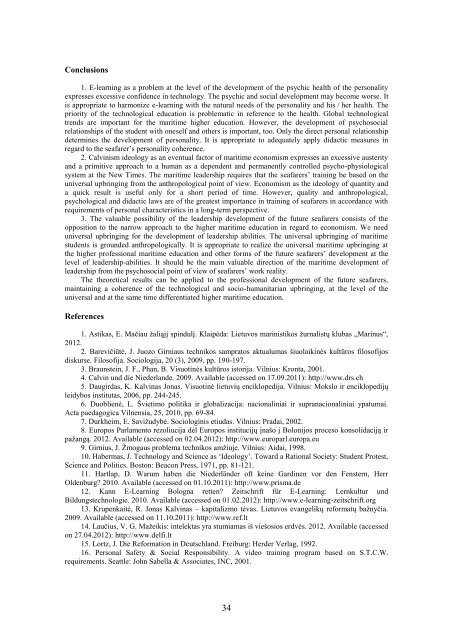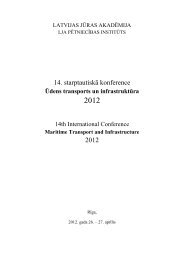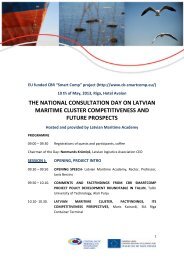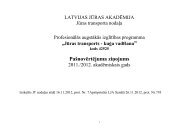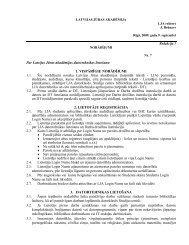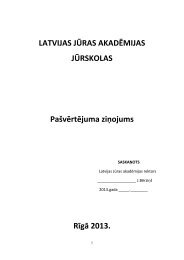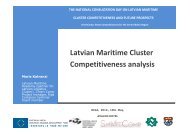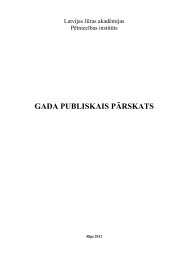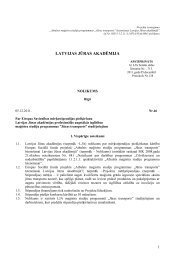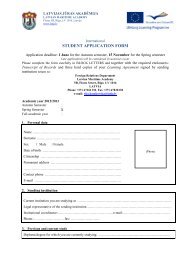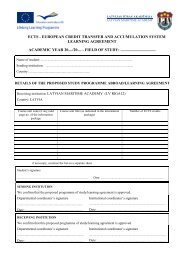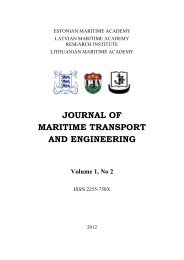You also want an ePaper? Increase the reach of your titles
YUMPU automatically turns print PDFs into web optimized ePapers that Google loves.
Conclusions1. E-learning as a problem at the level of the development of the psychic health of the personalityexpresses excessive confidence in technology. The psychic and social development may become worse. Itis appropriate to harmonize e-learning with the natural needs of the personality and his / her health. Thepriority of the technological education is problematic in reference to the health. Global technologicaltrends are important for the maritime higher education. However, the development of psychosocialrelationships of the student with oneself and others is important, too. Only the direct personal relationshipdetermines the development of personality. It is appropriate to adequately apply didactic measures inregard to the seafarer’s personality coherence.2. Calvinism ideology as an eventual factor of maritime economism expresses an excessive austerityand a primitive approach to a human as a dependent and permanently controlled psycho-physiologicalsystem at the New Times. The maritime leadership requires that the seafarers’ training be based on theuniversal upbringing from the anthropological point of view. Economism as the ideology of quantity anda quick result is useful only for a short period of time. However, quality and anthropological,psychological and didactic laws are of the greatest importance in training of seafarers in accordance withrequirements of personal characteristics in a long-term perspective.3. The valuable possibility of the leadership development of the future seafarers consists of theopposition to the narrow approach to the higher maritime education in regard to economism. We needuniversal upbringing for the development of leadership abilities. The universal upbringing of maritimestudents is grounded anthropologically. It is appropriate to realize the universal maritime upbringing atthe higher professional maritime education and other forms of the future seafarers’ development at thelevel of leadership-abilities. It should be the main valuable direction of the maritime development ofleadership from the psychosocial point of view of seafarers’ work reality.The theoretical results can be applied to the professional development of the future seafarers,maintaining a coherence of the technological and socio-humanitarian upbringing, at the level of theuniversal and at the same time differentiated higher maritime education.References1. Astikas, E. Mačiau žaliąjį spindulį. Klaipėda: Lietuvos marinistikos žurnalistų klubas „Marinus“,2012.2. Barevičiūtė, J. Juozo Girniaus technikos sampratos aktualumas šiuolaikinės kultūros filosofijosdiskurse. Filosofija. Sociologija, 20 (3), 2009, pp. 190-197.3. Braunstein, J. F., Phan, B. Visuotinės kultūros istorija. Vilnius: Kronta, 2001.4. Calvin und die Niederlande. 2009. Available (accessed on 17.09.2011): http://www.drs.ch5. Daugirdas, K. Kalvinas Jonas. Visuotinė lietuvių enciklopedija. Vilnius: Mokslo ir enciklopedijųleidybos institutas, 2006, pp. 244-245.6. Duoblienė, L. Švietimo politika ir globalizacija: nacionaliniai ir supranacionaliniai ypatumai.Acta paedagogica Vilnensia, 25, 2010, pp. 69-84.7. Durkheim, E. Savižudybė. Sociologinis etiudas. Vilnius: Pradai, 2002.8. Europos Parlamento rezoliucija dėl Europos institucijų įnašo į Bolonijos proceso konsolidaciją irpažangą. 2012. Available (accessed on 02.04.2012): http://www.europarl.europa.eu9. Girnius, J. Žmogaus problema technikos amžiuje. Vilnius: Aidai, 1998.10. Habermas, J. Technology and Science as ‘Ideology’. Toward a Rational Society: Student Protest,Science and Politics. Boston: Beacon Press, 1971, pp. 81-121.11. Hartlap, D. Warum haben die Niederländer oft keine Gardinen vor den Fenstern, HerrOldenburg? 2010. Available (accessed on 01.10.2011): http://www.prisma.de12. Kann E-Learning Bologna retten? Zeitschrift für E-Learning: Lernkultur undBildungstechnologie. 2010. Available (accessed on 01.02.2012): http://www.e-learning-zeitschrift.org13. Krupenkaitė, R. Jonas Kalvinas – kapitalizmo tėvas. Lietuvos evangelikų reformatų bažnyčia.2009. Available (accessed on 11.10.2011): http://www.ref.lt14. Laučius, V. G. Mažeikis: intelektas yra stumiamas iš viešosios erdvės. 2012. Available (accessedon 27.04.2012): http://www.delfi.lt15. Lortz, J. Die Reformation in Deutschland. Freiburg: Herder Verlag, 1992.16. Personal Safety & Social Responsibility. A video training program based on S.T.C.W.requirements. Seattle: John Sabella & Associates, INC, 2001.34


